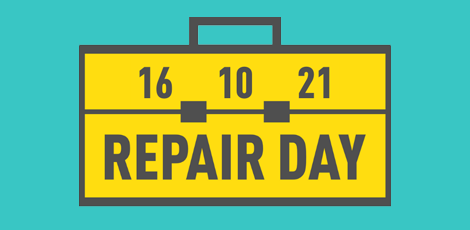International Repair Day

By Tracy Moss, DIY VISTA
What do a fast-food ice cream machine, an $800,000 tractor, and the latest smartphone have in common? And what does this connection have to do with the Kansas City Public Library?
These three seemingly unrelated items and their manufacturers are embroiled in the battle over the Right to Repair (R2R), a global movement aimed at fighting waste. Advocates of this movement ask that manufacturers be required to make their products repairable — and not just at their own repair shops by their own technicians.
“If you can’t fix it, you don’t own it,” says Kyle Wiens, co-founder of iFixit.com, a site dedicated to providing open-source repair manuals for all electronic devices. The R2R movement is about more than just devices, however.
Have you heard the joke about how often McDonald’s ice cream machines are out of service? Believe it or not, there is an actual explanation behind this. Anytime anything goes wrong with the equipment, the store must wait for the manufacturer to send a technician to troubleshoot the error code and fix the machine.
Similarly, farmers deal with the frustration of waiting for authorized repairs on broken equipment during the time-sensitive growing season. Some have even resorted to “hacking” their expensive piece of machinery in order to get back to work faster.
Manufacturers have pushed so-called maintenance-free products for decades. The result? Most people do not have the slightest idea where to begin if something malfunctions; they run to a store for a new piece of equipment and send what they think is irreparable to the landfill.
This strategy is a waste of money and valuable resources. This strategy is damaging to our planet. This strategy is not sustainable.
“When we repair something, everything that was needed to make it is preserved and intact, embodied within it: the energy, the materials, all of the time and talents required to manufacture it. When we recycle, much of that is lost. When we throw something ‘away’ and buy something new, all of that is lost” (John Wackman, Repair Revolution, 2020).
In its August 2021 report, the Intergovernmental Panel on Climate Change (IPCC) issued strong warnings regarding human-induced global warming.
This is "a code red for humanity. The alarm bells are deafening, and the evidence is irrefutable," says U.N. Secretary-General António Guterres in response to the most recent report.
However, not all hope is lost.
IPCC experts say that a “strong and sustained reduction” of carbon dioxide (CO2) emissions and other greenhouse gases could stabilize global temperatures within 20 to 30 years. But achieving that reduction will need to be a joint effort by consumers and manufacturers.
The majority of a product’s carbon footprint stems from the manufacturing process, so promoting repair rather than replacement should be a no-brainer for those going to bat for the environment. The Kansas City Public Library (KCPL), with assistance from AmeriCorps VISTA, is exploring the role the Library can play in the repair revolution.
And the time to act is now. The Kansas City Public Library is in the perfect position to connect people to resources for the knowledge and skills they need to do their part. The Library is working to develop DIY and repair programming, so be on the lookout for opportunities in the near future.
It’s been over a century since social activist Patrick Geddes encouraged people to “think globally, act locally.” Significant change still begins at the local level. It begins with you.
Saturday, October 16, 2021, is International Repair Day.
Think about ways you can help be the change at your local level. Fix up the old bicycle in your garage. Check out a home repair book from the Library. Think twice before upgrading to a new device. Creatively mend a beloved sweater.
A fixed thing is a beautiful thing.